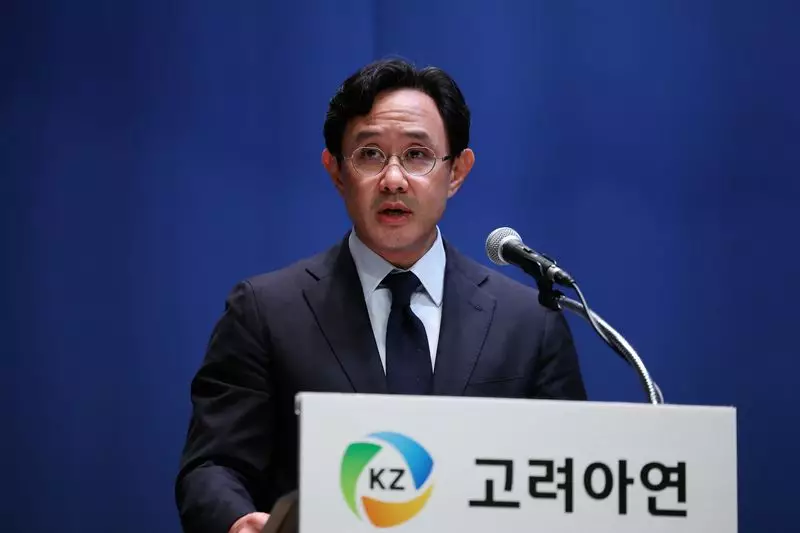Korea Zinc, the world’s foremost zinc refiner, recently found itself at the center of a corporate controversy as it withdrew a plan to issue new shares valued at approximately $1.8 billion. This strategic reversal comes in light of an investigation prompted by South Korea’s financial watchdog, alongside a marked sell-off of the company’s stock. The underlying tensions illuminate not just regulatory scrutiny but also a brewing conflict among major shareholders, which adds complications to an already volatile corporate environment.
The initial announcement regarding the share issuance led to a fluctuation in Korea Zinc’s stock. Following the announcement, shares surged by 6%, only to tumble by 7% later on as negative reactions mounted from both investors and regulatory bodies. The Financial Supervisory Service (FSS) intervened, delving into whether the share issuance was executed under fair conditions. The subsequent pressure culminated in a decision by Korea Zinc to retract its proposal, which the company claims was made in the interest of restoring investor confidence and addressing market concerns.
This development presents a critical juncture for the firm, indicating that even the largest players in the market are not immune to the uncertainties that can arise from regulatory oversight and investor sentiment. The sharp sell-off underscores the fragile nature of investor trust and the broader ramifications that strategic decisions can impose on market performance.
At the heart of this situation is a contentious takeover battle between Korea Zinc’s Chairman, Yun B. Choi, and rival bidders Young Poong and the private equity firm MBK Partners, both of whom have significantly increased their stakes in the company. Young Poong and MBK’s combined holding of nearly 40% contrasts sharply with Choi’s approximately 35%, intensifying the competitive atmosphere leading up to the forthcoming shareholder meeting.
The atmosphere is set for a boardroom confrontation, as the two shareholder groups prepare to lobby for control. Young Poong and MBK Partners have already filed for a court order to convene a special shareholder meeting, signaling an escalation of tactics in seeking representation. The two have nominated 14 new board members to secure more than half of the board, a move that hints at their ambitions to reshape the company’s strategic vision. This situation reflects the escalating tensions between legacy leadership and emerging power players in Korea Zinc’s corporate governance.
Strategic Implications for Corporate Governance
In light of the corporate turmoil, Korea Zinc has articulated its commitment to enhancing governance structures within the company. In a recent statement, the firm expressed an intent to actively pursue initiatives aimed at boosting board independence and improving oversight. This proactive approach may be perceived as an attempt to placate both regulators and wary investors, showing responsiveness to calls for better governance.
Furthermore, as Chairman Choi, who hails from the company’s founding family, prepares for a public address, the anticipation surrounding his strategy to bolster investor support is palpable. Engaging key stakeholders, including the National Pension Service, which holds over 5% of shares, will be essential in determining the company’s governance trajectory.
Korea Zinc’s journey through this turbulent chapter is a telling reflection of broader themes in modern corporate battles. The firm’s decision to withdraw its share issuance not only highlights the immediate challenges faced by its management but also underscores the importance of strategic communication with investors and regulatory bodies. As the shareholder meeting approaches, the outcomes of this conflict could redefine the corporate hierarchy within Korea Zinc, and possibly influence reforms in corporate governance practices throughout South Korea’s industrial landscape.
This scenario serves as a reminder that in the fiercely competitive and regulated environment of corporate finance, agility and responsiveness are key to navigating challenges and preserving stakeholder confidence. The aftermath of this unfolding corporate drama will certainly shape Korea Zinc’s narrative in the financial sector, making it a crucial case study for future engagements in corporate governance and strategic planning.

